I remember Elwy Yost quite vividly. I’m pretty sure he’s the only thing I ever watched on TVO with his Saturday Night at the Movies (1974 – 1999). I always thought he was too much of a nerd. He had a funny name. And he was so interested in those old movies …
Reacquainted with Myrna Loy and William Powell
Last week I went on a run of watching and writing about some Myrna Loy and William Powell movies I have in my collection. I went through four five of them, three four of which I’ve had here, unwatched, for about five years.
Easy Living (1937): Everybody fall down
When a an expensive fur coat falls on her head, Mary Smith’s life of scraping together enough for food and rent turns upside down. She suddenly finds herself in a world of wealth, as she’s mistakenly perceived of as the mistress of Wall Street banker and tycoon, J.B. Ball.
Easy living was never so hard — or muddled and funny.
American Rebel: Eastwood bio a disappointing read
While I remember the song from Rawhide I don’t recall ever having seen it. For me, Clint Eastwood’s career would have begun with A Fistful of Dollars (1964).
Watching movies
Don’t ask me when this picture was taken. It’s enough to say, quite a while ago.
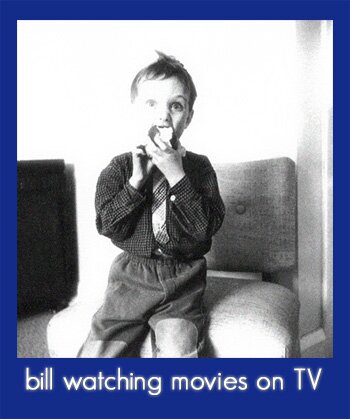
For what it is worth, I’ve also posted a review I wrote of Gone With the Wind (1939). It was written somewhere around December of 2004.
Four movies and a post
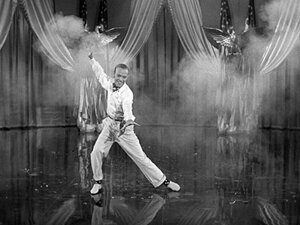 Over this holiday period, while I haven’t been posting on any of my sites, neither have I been sitting still.
Over this holiday period, while I haven’t been posting on any of my sites, neither have I been sitting still.
Here on Piddleville, I actually have been adding reviews, though not highlighting them on the home page here.
I hope to rectify that today. So, recently seen …
Holiday Inn (1942)
The movie Holiday Inn is memorable for a number of things, some good, some not so good. To begin with, it brings together a trio made up of Irving Berlin, Bing Crosby and Fred Astaire. Not a bad place to start. The movie itself is a Hollywood soufflé, very light, very unlikely, and quite delightful…
Read more
Unbreakable (2002)
Movies with surprise endings don’t often work well and, even when they do, it’s easy to tire of them quickly. In a sense, they are gimmicky. Done rarely, they’re riveting; done often, they’re tedious. I think M. Night Shyamalan knows this and feels the same way … You get the sense as you watch Unbreakable that he was trying to avoid the surprise ending. On the other hand, you also get the sense that stories of that kind are his natural inclination…
Read more
The Bells of St. Mary’s (1945)
The Bells of St. Mary’s is movie that is very representative of a type of movie Hollywood made in its heyday, very much the way it’s predecessor was, Going My Way. On one hand, it is a type of film that Hollywood has continued to make (like certain Disney films) with varying degrees of success – family oriented and sentimental. On the other hand, it is anachronistic and, for some, nostalgic…
Read more
Now, Voyager (1942)
Here’s a movie that caught me by surprise. It’s another one of those films I went into with little or no expectations. In fact, if anything, I expected it to be a dud. (I had seen a number of older, black and white turkeys recently.) Now, Voyager was wonderful. It’s also an unapologetic soap opera, the kind Hollywood once did so well…
Read more
And now you are up to date. Sort of. More or less. My memory isn’t great; I may have have forgotten something …
Christmas in Connecticut almost great
Some movies leave you scratching your head, like Christmas in Connecticut. You like it yet it bugs you. Why is that?
This is another one of those movies I saw years ago as a kid watching TV in the basement. The DVD came out in 2005 and I recall watching it then but feeling ambivalent about it. I suppose I still do, though I liked it much more when I watched it last night. But that opening …
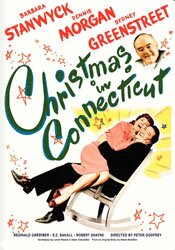 Christmas in Connecticut (1945)
Christmas in Connecticut (1945)
Directed by Peter Godfrey
This movie is an odd duck. It’s a good, quick paced Christmas movie of the old Hollywood variety, as in circa the 1940s (which is when it was made). Christmas in Connecticut has all the appearance of what we usually mean by a holiday classic. But it has some peculiarities and they are probably the reason it doesn’t quite achieve that status – though it comes close.
The first and most pronounced peculiarity is its opening. The first twenty or thirty minutes of the film are completely unnecessary and also suggest a different movie than the one we end up seeing. The movie is also a lot more interesting once that opening is over.
For some reason, perhaps length or a script change elsewhere in the film, the opening appears to be tacked on to what seems like a finished movie. Jefferson Jones, played by Dennis Morgan, is a war veteran in a hospital having survived being adrift at sea. He’s absolutely obsessed with food. This sort of sets up the movie that follows, except once that movie starts his food obsession seems to mysteriously vanish.
Food is at the heart of this romantic-comedy in the sense that it is one of the defining characteristics of Barbara Stanwyck’s character, Elizabeth Lee. She’s a kind of war time Martha Stewart, a famous master of country kitchens and homes, known as the world’s best cook. She writes for a magazine about her beautiful country home and describes the fabulous foods she prepares.
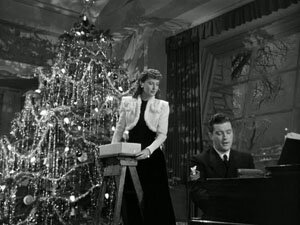 Except she’s a city apartment dweller and doesn’t know the first thing about cooking. The complication comes when her publisher, Sydney Greenstreet as Alexander Yardley, decides to invite himself and the war hero to Christmas at her home.
Except she’s a city apartment dweller and doesn’t know the first thing about cooking. The complication comes when her publisher, Sydney Greenstreet as Alexander Yardley, decides to invite himself and the war hero to Christmas at her home.
Chaos follows. There are also numerous complications, not the least of which is the need to have a husband and baby because Elizabeth Lee writes about them all the time.
It’s also quite funny, especially when Greenstreet’s Yardley sees one baby on one day and another on the next and can’t understand why it looks different, has a gender change, suddenly has teeth and can talk. “Most peculiar,” he says.
The romantic aspect is with Stanwyck’s character agreeing to marry her insistent fiancé (whom she doesn’t love) in return for providing her with a Connecticut country home to use to fool Yardley. The romance comes in when she falls in love with Jefferson, the war hero.
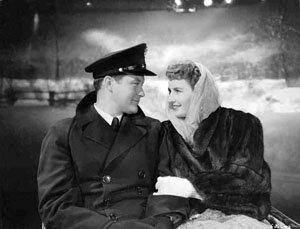 I also found some of the characterizations in the movie a bit peculiar, though not necessarily in a bad way. They just seemed odd. As mentioned, there is a food obsessed war hero who seems to forget his obsession once the real movie starts. Then there is Stanwyck’s Elizabeth Lee who appears to be completely self-centred and indulgent – yet we like her.
I also found some of the characterizations in the movie a bit peculiar, though not necessarily in a bad way. They just seemed odd. As mentioned, there is a food obsessed war hero who seems to forget his obsession once the real movie starts. Then there is Stanwyck’s Elizabeth Lee who appears to be completely self-centred and indulgent – yet we like her.
Despite the quibbles, I really did like this movie, especially once that opening was over. It certainly has the look and feel of a Hollywood holiday classic. It’s also funny and, in its Hollywood way, romantic. It gets great supporting performances, particularly those of Greenstreet, S.Z. Sakall (as the real food master) and Una O’Connor with her thick Irish accent and wonderful reactions.
For me, this movie played well – quick, engaging and almost, but not quite, satisfying. Had a bit of time been taken editing the opening, I would say it would be up there with the great holiday movies.
And I’m darned curious about how that opening came about.
On Amazon:
- Christmas in Connecticut (1945) — Video on Demand
- Christmas in Connecticut (1945) — DVD — Amazon.com (U.S.)
- Christmas in Connecticut (1945) — DVD — Amazon.ca (Canada)
Comedy gem – Planes, Trains and Automobiles
I’ve been prattling about comfort movies recently but so far have suggested only one example from the list I’m compiling. But tomorrow, Thursday, is Thanksgiving in the United States — which may go back as far as 1565, finding its start in Florida. I say “may.” I’m not saying it is so. 
Regardless, that brings me to one of my favourite “comfort movies” of all, Planes, Trains and Automobiles, a movie that is all about Thanksgiving.
Planes, Trains and Automobiles (1987)
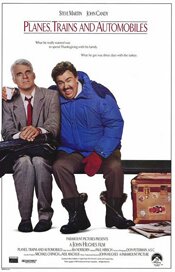 Directed by John Hughes
Directed by John Hughes
Planes, Trains and Automobiles is an absolute gem of a movie. One of the reasons it succeeds so well is because it is so simple and maintains its focus throughout.
Steve Martin (Neal) is heading home to Chicago for Thanksgiving. So is John Candy (Del). They are travellers with personalities at opposite ends: Neal is a prim and proper, an anal businessman, while Del is a talkative, somewhat crass low-rent guy who sells shower curtain rings. Circumstances, increasingly ludicrous yet believable, keep throwing them together. Martin’s character feels nothing but irritation about his situation and with Candy’s character while Candy’s Del is oblivious – he just goes with the flow. Together, they take planes, trains, cars, trucks and so on as they try to get home.
It’s a variation of the buddy, road-movie of film. But I think it shows why these kinds of movies are so popular when they’re well done. It is all about the characters and their relationship. In this case, Steve Martin and John Candy are a perfect pairing. I’ve always liked Martin best when he plays more of a straight character. In this film, he plays straight though this doesn’t mean he’s not comedic. On the contrary, he is more comedic because of this. Everything happens to him and his reactions are priceless.
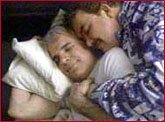 Candy, on the other hand, has never been more lovably obnoxious. He’s the boob, the stooge. Always well-intentioned but almost everything he does causes disaster for Martin’s Neal. It’s very much a Laurel and Hardy or Martin and Lewis kind of combination that they play. A lot of the humour is slapstick – visual – and it works well. While many comedies are amusing, I find I don’t often laugh as I watch them, though I may smile. In this movie, I laughed. And that is the litmus test for comedy.
Candy, on the other hand, has never been more lovably obnoxious. He’s the boob, the stooge. Always well-intentioned but almost everything he does causes disaster for Martin’s Neal. It’s very much a Laurel and Hardy or Martin and Lewis kind of combination that they play. A lot of the humour is slapstick – visual – and it works well. While many comedies are amusing, I find I don’t often laugh as I watch them, though I may smile. In this movie, I laughed. And that is the litmus test for comedy.
The film, however, doesn’t work just because of its comedy. And the comedy doesn’t work in a vacuum. The characters created by writer-director John Hughes’ script, and brought to life by Martin and Candy, are what allow everything to play out successfully. It’s in the developing relationship, and the degree of depth the actors give their characters, that guides the movie forward.
The movie isn’t just about getting laughs; it has a theme which is the value of home and relationships. Thematically, it’s similar to It’s A Wonderful Life. It’s not particularly profound; it’s rather simple. But again, this simplicity is part of what allows the film to work and also part of its appeal. It’s accessible and understandable to pretty much everyone. The key in making a movie such as this is avoiding a saccharine quality. This movie, while it may have a wisp of that, doesn’t succumb and this gives it credibility. The humour, too, takes the edge off any hint of sappiness.
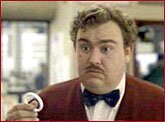 I think, too, there’s something worth an essay or two in the fact that movies like Planes, Trains and Automobiles (and many Capra films like It’s A Wonderful Life) can be and are watched over and over again.
I think, too, there’s something worth an essay or two in the fact that movies like Planes, Trains and Automobiles (and many Capra films like It’s A Wonderful Life) can be and are watched over and over again.
Why is something so simple so compelling? Why do other, more apparently profound films, hard to view more than once without becoming bored, while films like this can be seen again and again? As with children when they want to hear the same story over and over, certain stories, certain themes, address something we need to have repeated for one reason or another. I think it probably has something to do with truth – not the truth of tangible reality, but some truth or truths about us, people, and our relationships with one another.
If you haven’t seen Planes, Trains and Automobiles, or if it has been a while since you’ve seen it, this one is highly recommended. It’s what a comedy should be – funny. In fact the only reservation I have about the movie, the only thing I could find fault with, is the music. It sets the film far too firmly in the 1980’s. If the music were removed, the film is timeless.
But don’t worry – the music isn’t bad. Just anachronistic. And it doesn’t interfere with the enjoyment of the film. (But let me add – I loved the carousel sounding rendition of the Red River Valley song.)
On Amazon:
- Planes, Trains and Automobiles — Video on Demand
- Planes, Trains and Automobiles — DVD, Amazon.com (U.S.)
- Planes Trains and Automobiles — DVD, Amazon.ca (Canada)
Familiarity: a characteristic of the comfort movie?
A friend of mine went to visit some friends in Edmonton a few months ago. When she returned, I asked her what she had done. “Nothing,” she said.
“Did you go anywhere?”
“Nope.”
“Did you at least go to that restaurant I told you about?”
“No; there wasn’t time.”
She had been there for over a week. Yet all she had done was spend time with her friends.
That’s what some comfort movies are.
Many years ago when the marathon-like M*A*S*H was finally ending its time on television, someone made the observation that few people had watched it because they were eager to see the next episode. They weren’t wondering what would happen next. They were watching simply because they wanted to spend time with the characters they had come to know so well.
That is what some comfort movies do. Many of the John Wayne movies are like this. They may have drama or comedy but many people watch them simply to spend time with their idea of John Wayne and the characters associated with him.
This particularly comes across in his later movies, like Hatari! or Donovan’s Reef, or even an earlier movie like The Quiet Man. Their merits as films aside, people watch to see the Duke and the actors/characters associated with him, like Maureen O’Hara. There is a sense of knowing them, of a personal relationship, though we know that couldn’t possibly be true – we’ve never even met them! Yet we feel that way.
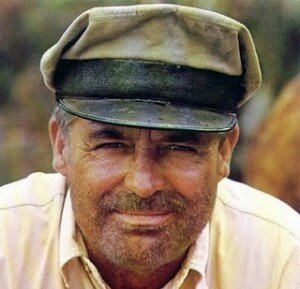 So it strikes me that a characteristic of comfort movies is familiarity. We revisit certain movies in the same way we revisit certain friends and family. Familiarity. We enjoy spending time with them. This is why they are comfort movies.
So it strikes me that a characteristic of comfort movies is familiarity. We revisit certain movies in the same way we revisit certain friends and family. Familiarity. We enjoy spending time with them. This is why they are comfort movies.
Although it’s not the movie I’d like to start off with (it’s a bit misleading as far as what I consider a comfort movie to be), my favourite movie as far as this category goes is Father Goose.
Gasp! Am I nuts? Possibly. But for me this movie is as comfortable as old slippers. And that may be a good analogy because this movie is probably just as fashionable. Besides, it stars the always familiar Cary Grant, whom many simply like to watch. In anything.
- Review: Father Goose 1964



